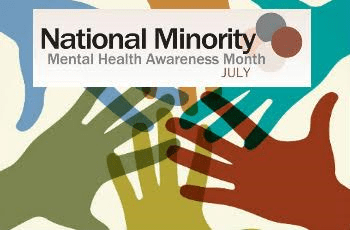
MSW candidate Dequindre Wiggins says this about National Minority Mental Health Awareness Month. “It’s good to have, because of the stigma around mental health issues, especially for Black and Brown communities.” But the fact that we have to make such a designation, “speaks to where this country is regarding mental health services for minorities,” Wiggins says. “If there were equal opportunity and access we wouldn’t need to designate a month for minority mental health. We have months designated for minorities, but if we really respected cultures and peoples, we wouldn’t need all these months.”
Before the COVID-19 pandemic, Wiggins and some of his classmates had planned a trip to Ghana to learn about its mental health system. “The mental health and social work concepts we have been taught here are Eurocentric,” Wiggins explains. “Our system was originally structured for white folks, and we want to restructure it to work for Black and Brown folks, too. We want to observe the mental health system in a country run by Black and Brown folks. Then we can use what we learn to improve mental health care for Black and Brown folks in the U.S.”
Ghana is on hold for the moment. In the meantime, Wiggins is serving Detroit youth via his internship at The Youth Connection. He speaks by phone with transitional youth ages 14 to 23, and he holds training and seminars with them. “A lot of kids are experiencing trauma right now,” he says, “coping with COVID, the protests, and all that is going on in their personal lives.” National Minority Mental Health Awareness Month creates a moment for us to acknowledge how hard both COVID and structural racism have hit Detroit—and Detroit youth in particular. But as Dequindre Wiggins suggests, real change will take more than a month. It will take restructuring, and it will take respect.